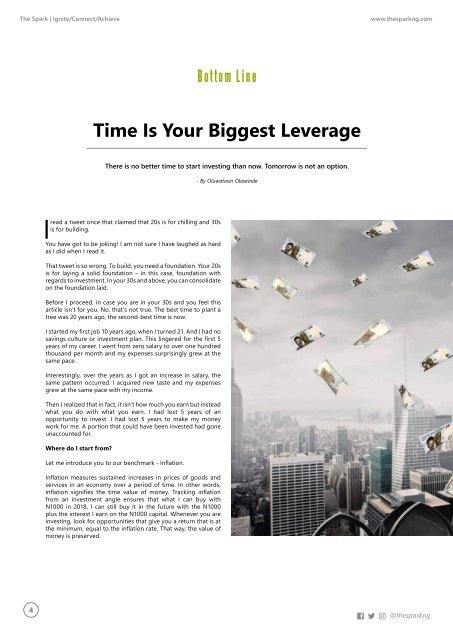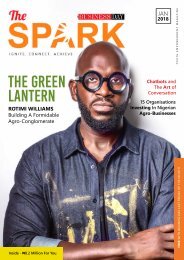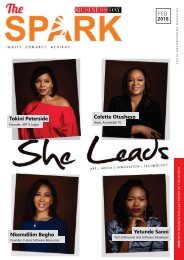May 2018
You also want an ePaper? Increase the reach of your titles
YUMPU automatically turns print PDFs into web optimized ePapers that Google loves.
The Spark | Ignite/Connect/Achieve www.thesparkng.com www.thesparkng.com The Spark | Ignite/Connect/Achieve<br />
I<br />
read a tweet once that claimed that 20s is for chilling and 30s<br />
is for building.<br />
You have got to be joking! I am not sure I have laughed as hard<br />
as I did when I read it.<br />
That tweet is so wrong. To build, you need a foundation. Your 20s<br />
is for laying a solid foundation – in this case, foundation with<br />
regards to investment. In your 30s and above, you can consolidate<br />
on the foundation laid.<br />
Bottom Line<br />
Time Is Your Biggest Leverage<br />
There is no better time to start investing than now. Tomorrow is not an option.<br />
- By Oluwatosin Olaseinde<br />
What are your options?<br />
1. Savings account: This asset class offers an average of 5% per annum.<br />
Nigeria’s current inflation rate is 12.5%, as a result the returns on<br />
savings isn’t a good return for the money you worked hard for as it is<br />
not high enough to beat inflation.<br />
2. Treasury Bills/Government Bond: The government issues Treasury<br />
Bills (T-Bills) and Government Bonds when it needs to borrow money.<br />
T-Bills are short-term in nature while Government bond is long term.<br />
For T-Bills, the interest is paid in advance. So for instance if you<br />
invested N100,000 for a year and T-Bill rate is 12%, you will get the<br />
interest of N12,000 in advance. Government bond interest is paid<br />
every quarter. Always compare the rates on T-Bills and Bonds to<br />
inflation rate.<br />
3. Mutual Fund: This is an investment vehicle made up of a pool of<br />
moneys collected from several investors for investing in securities<br />
such as T-Bills, Bonds, equities, commercial papers and even real<br />
estate.<br />
The most common one is money market fund. Your capital is secured and<br />
you can start with as little as N5,000. The rate ranges at 14%. With an<br />
inflation rate of 12.5%. This is a good place to start.<br />
4. Equities: The shares of a company measure its financial performance.<br />
Nigeria stock exchange was the 3rd best performing exchange in the<br />
world last year, it returned 43%; almost thrice the inflation rate. Do<br />
your research, choose fundamentally strong stocks and invest. Equity<br />
investment is a long-term play.<br />
5. Real Estate: Real Estate generates return via capital appreciation,<br />
due to increase in the value of the property, and through rental<br />
income. In a country like Nigeria, a bulk of real estate growth comes<br />
from appreciation of the property. Historically, real estate returns as<br />
high as 40% per annum. Location and purpose of property plays a<br />
critical role in value addition.<br />
6. Personal Development: This is my favourite class of investment. You<br />
– insert your name – are your greatest investment. Unlike all the other<br />
options, you are immune to inflation rates, currency devaluation or<br />
value erosion. Take that course that will take you to the next level,<br />
take up new challenges, prepare for new opportunities, read those<br />
books. Ensure you are deliberate about improving yourself.<br />
It is one thing to know all the investment options available, it is another to<br />
take the right step. Time is a great currency here and the earlier you start,<br />
the better. It is easier to start now than trying to play catch up 15 years<br />
to retirement. Besides, you owe it to yourself to pay yourself first, which<br />
means investing now.<br />
Before I proceed, in case you are in your 30s and you feel this<br />
article isn’t for you. No, that’s not true. The best time to plant a<br />
tree was 20 years ago, the second-best time is now.<br />
I started my first job 10 years ago, when I turned 21. And I had no<br />
savings culture or investment plan. This lingered for the first 5<br />
years of my career. I went from zero salary to over one hundred<br />
thousand per month and my expenses surprisingly grew at the<br />
same pace.<br />
Interestingly, over the years as I got an increase in salary, the<br />
same pattern occurred. I acquired new taste and my expenses<br />
grew at the same pace with my income.<br />
Then I realized that in fact, it isn’t how much you earn but instead<br />
what you do with what you earn. I had lost 5 years of an<br />
opportunity to invest. I had lost 5 years to make my money<br />
work for me. A portion that could have been invested had gone<br />
unaccounted for.<br />
Where do I start from?<br />
Let me introduce you to our benchmark - Inflation.<br />
Inflation measures sustained increases in prices of goods and<br />
services in an economy over a period of time. In other words,<br />
inflation signifies the time value of money. Tracking inflation<br />
from an investment angle ensures that what I can buy with<br />
N1000 in <strong>2018</strong>, I can still buy it in the future with the N1000<br />
plus the interest I earn on the N1000 capital. Whenever you are<br />
investing, look for opportunities that give you a return that is at<br />
the minimum, equal to the inflation rate. That way, the value of<br />
money is preserved.<br />
“<br />
Whenever you are investing, look<br />
for opportunities that give you a<br />
return that is at the minimum,<br />
equal to the inflation rate.<br />
“<br />
4 5<br />
@thesparkng<br />
@thesparkng








